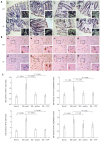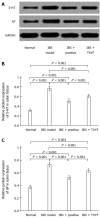Tong Xie Yao Fang relieves irritable bowel syndrome in rats via mechanisms involving regulation of 5-hydroxytryptamine and substance P
- PMID: 25914462
- PMCID: PMC4402300
- DOI: 10.3748/wjg.v21.i15.4536
Tong Xie Yao Fang relieves irritable bowel syndrome in rats via mechanisms involving regulation of 5-hydroxytryptamine and substance P
Abstract
Aim: To investigate whether the Chinese medicine Tong Xie Yao Fang (TXYF) improves dysfunction in an irritable bowel syndrome (IBS) rat model.
Methods: Thirty baby rats for IBS modeling were separated from mother rats (1 h per day) from days 8 to 21, and the rectum was expanded by angioplasty from days 8 to 12. Ten normal rats were used as normal controls. We examined the effects of TXYF on defection frequency, colonic transit function and smooth muscle contraction, and the expression of 5-hydroxytryptamine (5-HT) and substance P (SP) in colonic and hypothalamus tissues by Western blot and RT-PCT techniques in both normal rats and IBS model rats with characterized visceral hypersensitivity.
Results: Defecation frequency was 1.8 ± 1.03 in normal rats and 4.5 ± 1.58 in IBS model rats (P < 0.001). However, the defecation frequency was significantly decreased (3.0 ± 1.25 vs 4.5 ± 1.58, P < 0.05), while the time (in seconds) of colon transit function was significantly increased (256.88 ± 20.32 vs 93.36 ± 17.28, P < 0.001) in IBS + TXYF group rats than in IBS group rats. Increased colonic smooth muscle tension and contract frequency in IBS model rats were significantly decreased by administration of TXYF. Exogenous agonist stimulants increased spontaneous activity and elicited contractions of colon smooth muscle in IBS model rats, and all of these actions were significantly reduced by TXYF involving 5-HT and SP down-regulation.
Conclusion: TXYF can modulate the activity of the enteric nervous system and alter 5-HT and SP activities, which may contribute to the symptoms of IBS.
Keywords: 5-hydroxytryptamine; Irritable bowel syndrome; Substance P; Tong Xie Yao Fang; Traditional Chinese medicine.
Figures




Similar articles
-
Effect of Tong Xie Yao Fang on endogenous metabolites in urine of irritable bowel syndrome model rats.World J Gastroenterol. 2019 Sep 14;25(34):5134-5151. doi: 10.3748/wjg.v25.i34.5134. World J Gastroenterol. 2019. PMID: 31558862 Free PMC article.
-
Tong-Xie-Yao-Fang improves intestinal permeability in diarrhoea-predominant irritable bowel syndrome rats by inhibiting the NF-κB and notch signalling pathways.BMC Complement Altern Med. 2019 Nov 27;19(1):337. doi: 10.1186/s12906-019-2749-4. BMC Complement Altern Med. 2019. PMID: 31775739 Free PMC article.
-
Inhibitory effect of TongXie-YaoFang formula on colonic contraction in rats.World J Gastroenterol. 2015 Mar 14;21(10):2912-7. doi: 10.3748/wjg.v21.i10.2912. World J Gastroenterol. 2015. PMID: 25780288 Free PMC article.
-
Traditional Chinese medicine formulas for irritable bowel syndrome: from ancient wisdoms to scientific understandings.Am J Chin Med. 2015;43(1):1-23. doi: 10.1142/S0192415X15500019. Epub 2015 Jan 11. Am J Chin Med. 2015. PMID: 25579759 Review.
-
[Role of serotonin in the pathophysiology of the irritable bowel syndrome].Wiad Lek. 2007;60(7-8):371-6. Wiad Lek. 2007. PMID: 18175558 Review. Polish.
Cited by
-
Effect of Tong Xie Yao Fang on endogenous metabolites in urine of irritable bowel syndrome model rats.World J Gastroenterol. 2019 Sep 14;25(34):5134-5151. doi: 10.3748/wjg.v25.i34.5134. World J Gastroenterol. 2019. PMID: 31558862 Free PMC article.
-
Modified Tong Xie Yao Fang relieves solitary rectal ulcer syndrome: A case report.World J Clin Cases. 2019 Aug 6;7(15):2058-2064. doi: 10.12998/wjcc.v7.i15.2058. World J Clin Cases. 2019. PMID: 31423438 Free PMC article.
-
The efficacy of the traditional Korean herbal medicine Tongsayobang for the treatment of irritable bowel syndrome: A protocol for a systematic review and meta-analysis.Medicine (Baltimore). 2021 Dec 3;100(48):e28116. doi: 10.1097/MD.0000000000028116. Medicine (Baltimore). 2021. PMID: 35049241 Free PMC article.
-
Shaoyao-Gancao Decoction Relieves Visceral Hyperalgesia in TNBS-Induced Postinflammatory Irritable Bowel Syndrome via Inactivating Transient Receptor Potential Vanilloid Type 1 and Reducing Serotonin Synthesis.Evid Based Complement Alternat Med. 2020 Oct 15;2020:7830280. doi: 10.1155/2020/7830280. eCollection 2020. Evid Based Complement Alternat Med. 2020. PMID: 33123210 Free PMC article.
-
Tongxieyaofang Decotion Alleviates IBS by Modulating CHRM3 and Gut Barrier.Drug Des Devel Ther. 2024 Jul 24;18:3191-3208. doi: 10.2147/DDDT.S455497. eCollection 2024. Drug Des Devel Ther. 2024. PMID: 39081703 Free PMC article.
References
-
- Hou WR, Hou YL, Wu GF, Song Y, Su XL, Sun B, Li J. cDNA, genomic sequence cloning and overexpression of ribosomal protein gene L9 (rpL9) of the giant panda (Ailuropoda melanoleuca) Genet Mol Res. 2011;10:1576–1588. - PubMed
-
- Heitkemper M, Jarrett M, Jun SE. Update on irritable bowel syndrome program of research. J Korean Acad Nurs. 2013;43:579–586. - PubMed
-
- Gershon MD. Nerves, reflexes, and the enteric nervous system: pathogenesis of the irritable bowel syndrome. J Clin Gastroenterol. 2005;39:S184–S193. - PubMed
-
- Mulak A, Bonaz B. Irritable bowel syndrome: a model of the brain-gut interactions. Med Sci Monit. 2004;10:RA55–RA62. - PubMed
-
- Stasi C, Bellini M, Bassotti G, Blandizzi C, Milani S. Serotonin receptors and their role in the pathophysiology and therapy of irritable bowel syndrome. Tech Coloproctol. 2014;18:613–621. - PubMed
Publication types
MeSH terms
Substances
LinkOut - more resources
Full Text Sources
Other Literature Sources

